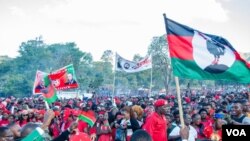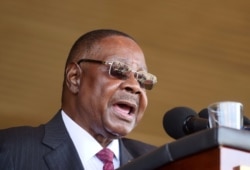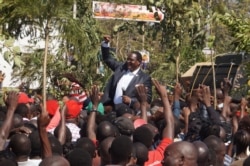The Malawi Electoral Commission says it is confident that Tuesday’s presidential election rerun will be fair and free of the irregularities that marred last year’s vote and led to annulling the re-election of Peter Mutharika.
Mutharika seeks a second five-year term. He faces two other candidates —main opposition leader Lazarus Chakwera and little-known Peter Kuwani — in a race that political analysts say is too close to call.
Polling preparations have been smooth, Chifundo Kachale, the commission chairperson, told reporters in a televised press conference Sunday.
“The commission is grateful to all the stakeholders for the cooperation and harmonious spirits that prevailed during the whole process,” he said. Any challenges were “handled harmoniously.”
However, Kachale acknowledged that the COVID-19 pandemic forced the commission to curtail some of its usual election preparation activities, such as meetings with traditional leaders.
“These have a tendency to bring together a lot people to one place, which can make the observance of physical distancing difficult at times,” he said.
The fresh polls come after the country’s Constitutional Court in February annulled the May 2019 elections over massive irregularities, a decision that the Supreme Court of Appeal upheld in May.
Newfound trust in system?
Rights campaigners who led street protests against last year’s results say they are confident that Tuesday’s polls will be free, fair and credible.
Mutharika appointed a new team to the electoral commission early this month after former chairperson Jane Ansah resigned and mandates expired for the other commissioners.
Charles Kajoloweka, executive director for the Youth and Society Organization, a local nonprofit organization, said he found it “inspiring” that the reconstituted commission’s leaders have promised better election management. Speaking with VOA via a messaging application, he cited “the transparency they are demonstrating,” saying it should lead to credible elections.
Unpredictable outcome
Although there are three candidates, Tuesday's election is largely between the 79-year-old Mutharika and his main rival, 65-year-old Chakwera. During last year’s disputed polls, Mutharika got 38% of the vote, while Chakwera came in a close second with 35%.
The Constitutional Court ordered that the winner of Tuesday’s elections must amass more than 50% of the valid votes.
This forced Mutharika, leader of the ruling Democratic Progress Party, to form an alliance with the opposition United Democratic Front, whose leader Atupele Muluzi came in fourth with 5% of the vote during the annulled polls.
Chakwera, leader of the Malawi Congress Party, formed an alliance with nine other opposition parties, including the United Transformation Movement, whose leader, Vice President Saulos Chilima, got 20% of the vote in the annulled election.
Both Chakwera and Mutharika told their supporters during their final campaign rallies Saturday that they were confident of winning this time around.
However, a recent survey by the Institute of Public Opinion and Research showed Chakwera with a 20-point lead.
Political analyst Sheriff Kaisi told VOA Monday that the game remains unpredictable because both candidates have massive supporters from rural areas where over 80% of the population lives. Mutharika comes from the southern region, while Chakwera comes from the central region.
“Probably, the upper hand will be the one who will control the regions, for example,” Kaisi said, noting the southern region has 13 districts, the central has nine and the northern has five. “So, the one who controls that larger part of the regions definitely is going to carry the day.”
Polling participation and safety
For Tuesday’s election, MEC said it will use last year’s voters roll, in which about 7 million Malawians registered to vote.
“We are not going to allow any new voters who registered after the event in 2019 to participate in this election,” Kachale, the commission chief, told VOA.
The vote is taking place amid COVID-19 risks. Kachale said election workers would wear masks and have other personal protective equipment. He added that polling centers would have “trained ushers at the polling centers to manage social distancing” among voters, who will have access to soap and water.
English to Africa’s James Butty contributed to this report.






